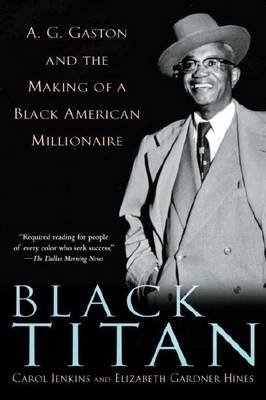Reviewed by Heather on
I had never heard of A.G. Gaston before this book showed up on Book Bub last year. I'm glad I found out about him. He had a remarkable life.
A.G. Gaston's grandparents were slaves. His grandfather worked with horses and his grandmother was an accomplished cook. These were considered "privileged" positions. When slavery ended they stayed on working for the family that previously owned them. His grandmother taught his mother to cook and she also earned a living working for wealthy white families as a live-in cook and as a sought after caterer. This put A.G. in contact with wealth at a young age.
When he was young there were two broad schools of thought about black advancement. Booker T. Washington believed that black people should stay where they were and work hard to advance economically before looking for social equality. W.E.B. DuBois believed in fighting for social equality and letting the "talented tenth" of black elites raise up the rest of the community. A.G. Gaston spent his life firmly in Booker T. Washington's camp.
After serving in WWI, he returned to Alabama and couldn't find a good job. He had to take work in the mines. He saw widows begging for money to pay for their miner husbands' funerals. He started a burial insurance business. From there he bought funeral homes. Eventually he started a bank for black people and a business training school.
He was in his seventies and wealthy when the civil rights movement game to Birmingham. He owned the only black hotel so Martin Luther King and the Southern Christian Leadership Conference set up shop there. I got the impression that he thought they were young radical whippersnappers. He argued for moderation. He wanted to negotiate instead of marching. But, he was the person that repeatedly bailed them out of jail - whether they wanted bailed out or not. He also argued vehemently against involving children in the marches and then secured the bond for the release of all the children jailed. People spoke of him as being too deferential to the white businessmen, especially if they didn't know that he was bankrolling a lot of the protests.
His hotel was bombed. His house was bombed. (He said he couldn't be sure if it was white or black people who wanted to bomb his house.) Bombs were set at other of his properties but were found before they went off. He let the marchers on the way to Selma camp on one of farms one night. He was even kidnapped.
After the protests moved away from Birmingham, he stayed and continued to serve the community. He was a philanthropist. Eventually he sold his business empire to his employees for a tenth of its worth to maintain local black control.
A.G. Gaston died at the age of 103. His story is amazing. He should definitely be better known.
This review was originally posted on Based On A True Story
Reading updates
- Started reading
- 29 January, 2017: Finished reading
- 29 January, 2017: Reviewed
